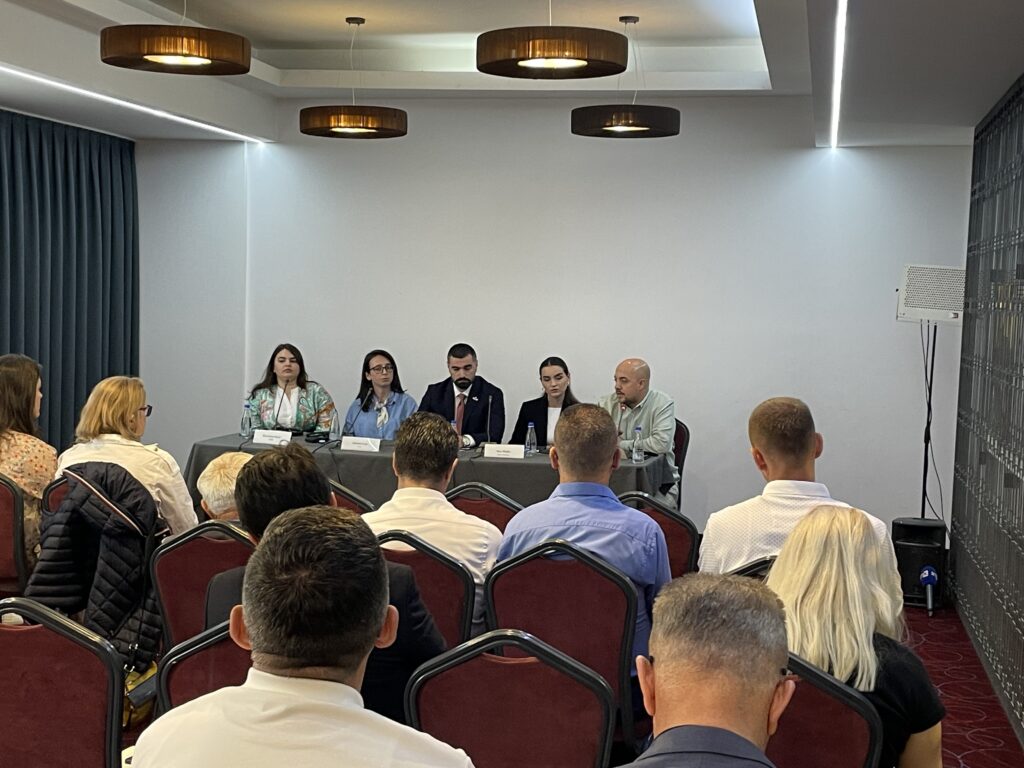Journalists in Kosovo reporting on war crimes trials face significant challenges in courts in Kosovo and at Specialist Chambers in The Hague. Journalists must deal with restrictions on physical access, limited information, a lack of transparency, and language issues.
In a discussion organised on Wednesday in Prishtina by the Humanitarian Law Center Kosovo, HLCK, regarding the role of media in shaping public opinion about war crime trials, journalists explained that they face different obstacles when reporting on the trials, including limited access to the Kosovo Specialist Chambers in the Hague and a lack of transparency in both The Hague and courts within Kosovo.
Xhorxhina Bami from the Balkan Investigative Reporting Network, BIRN, emphasised that journalists receive very little information from the Kosovo Specialist Chambers in The Hague.
This scarcity of information, according to her, can lead to misinterpretations.
“This complicates monitoring because when sessions are extended, the parties sometimes complain about how the session was reported on and about how it was presented to the public”, she claimed, explaining that often, because of the court functioning simultaneously in English, Albanian, and Serbian“statements are lost in translation”.
Bami also explained that the long wait to receive a transcript from the Specialist Chambers is another challenge faced by journalists reporting on the proceedings.
“We might have to wait at least one month for access to documents, which increases the difficulty we face and can also lead to misinterpretation,” Bami added, explaining that journalists in Kosovo have not been able to use the Law on Access to Public Documents, which establishes for a seven day deadline for institutions to provide requested documents.
Procedural and Language Barriers

Besides the issues with reporting from The Hague, local courts also pose challenges, particularly with the lack of documentation in Serbian. This was highlighted as a significant obstacle for Serbian journalists covering war crime trials within Kosovo.
Rina Mujku, a journalist from Klan Kosova television, praised the objectivity of the media when reporting on war crimes in Kosovo.
“In Kosovo, we are doing quite well because there are objective reports,” Mujku said.
Arbnora Luta, a journalist from ATV television, considers the limitations on journalists’ physical presence to be the biggest challenge facing war crimes journalists in Kosovo.to be.
“The lack of physical access to the court in The Hague and the access (to documents) in courts in Prishtina remains a challenge. We had the opportunity to be physically present (in the Hague), but we are not allowed to be directly involved. We are without phones; all we can have is a notebook and a pen,” Luta declared. She noted that at the Basic Court of Prishtina, where war crime trials are held within Kosovo, journalists can at least use their electronic devices in the courtroom, and, depending on the judge’s orders, even film the session, which in war crime cases, are mainly held in open sessions, unlike at The Hague.
For Sylejman Sylejmani from the InFokus online media outlet, the frequency of private sessions at the Kosovo Specialist Chambers makes reporting rather difficult.
“Even in the parts that are open, substantive issues are not discussed. If the session is closed, it is not known what the witness is testifying about. 60 percent of the sessions have been private,” he explained.
The Kosovo Specialist Chambers were set up in 2015 to try former Kosovo Liberation Army, KLA, guerrillas for wartime and post-war crimes. The court was established in The Hague by the Kosovo parliament, acting under pressure from Kosovo’s Western allies, who believed that Kosovo’s own justice system was not robust enough to try KLA cases and protect witnesses from intimidation.
Currently, former leaders of Kosovo institutions and former members of the KKLA, including former President Hashim Thaci, are being tried for war crimes and crimes against humanity in the Kosovo Special Chambers in The Hague.